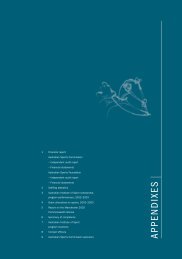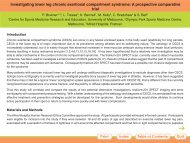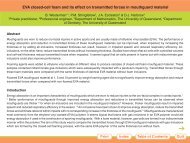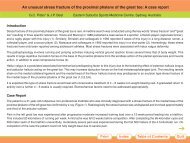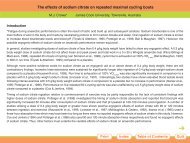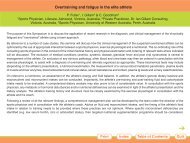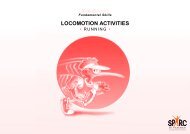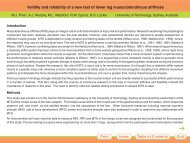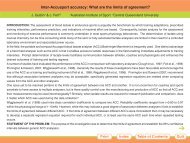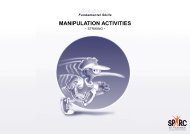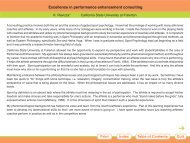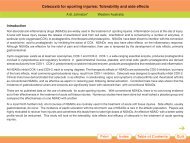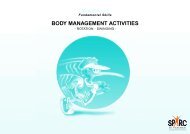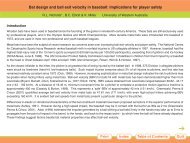australian swimming 93rd annual report 2001/2002
australian swimming 93rd annual report 2001/2002
australian swimming 93rd annual report 2001/2002
Create successful ePaper yourself
Turn your PDF publications into a flip-book with our unique Google optimized e-Paper software.
04 foreword<br />
After the outstanding performance of<br />
Australian swimmers at the Sydney Olympics,<br />
who could have predicted the events of the<br />
following year?<br />
At the <strong>2001</strong> FINA World Swimming<br />
Championships in Japan the Australian Swim<br />
team laid decisive claim to best-nation<br />
status—topping the gold-medal tally. To finally<br />
topple the United States team was a fitting<br />
farewell gift for retiring national head coach<br />
Don Talbot.<br />
The outstanding performances in Japan<br />
are chronicled elsewhere in this <strong>report</strong>,<br />
but a number of highlights are worthy of<br />
special mention.<br />
R Ian Thorpe’s six gold medals made him<br />
the highest gold-medal winner in World<br />
Swimming Championship history—with<br />
a career total so far of eight gold. Ian also<br />
broke four world records and was voted<br />
‘Best Performer of the Meet’.<br />
R Petria Thomas won the 100 and 200 metres<br />
butterfly ‘double’, adding to the gold she<br />
and fellow team-mates Dyana Calub, Leisel<br />
Jones and Sarah Ryan won in the 4 x 100<br />
metres medley relay.<br />
R Grant Hackett smashed the world record for<br />
the 1500 metres freestyle by more than<br />
seven seconds—a well-earned reward for<br />
his tenacity in chasing Kieren Perkins’ mark<br />
set at the 1994 Commonwealth Games.<br />
‘The Commonwealth Government, through the<br />
Australian Sports Commission, has committed<br />
$4.35 million to Australian Swimming.’<br />
R World records were set by our 4 x 200 metre<br />
freestyle relay team of Ian Thorpe, Grant<br />
Hackett, Michael Klim and William Kirby and<br />
by Geo≈ Huegill in the 50 metres butterfly.<br />
Australian Swimming capped o≈ a remarkable<br />
year by winning the <strong>2001</strong> Goodwill Games<br />
<strong>swimming</strong> meet, topping the overall goldmedal<br />
tally at the 6th FINA World Short Course<br />
Swimming Championships and taking out a<br />
host of other titles at FINA World Cups.<br />
Australian Swimming continues to display<br />
leadership in its support of swimmers with<br />
disabilities. For the first time, swimmers with<br />
disabilities have been integrated into the<br />
national team for the up-coming<br />
Commonwealth Games, participating in leadup<br />
events such as Telstra Grand Prix meets and<br />
pre-event camps. I know that the Australian<br />
Paralympic Committee appreciates Australian<br />
Swimming’s leadership. We all look forward to<br />
seeing our united team support and encourage<br />
each other at the Games.<br />
I am also pleased to see that Australian<br />
Swimming has forged formal partnerships with<br />
state <strong>swimming</strong> bodies, with the intention of<br />
delivering a national development strategy for<br />
the sport.<br />
It is encouraging to see national sporting<br />
organisations such as Australian Swimming<br />
take on a custodial role for the entire sport.<br />
It is a big task. One of <strong>swimming</strong>’s greatest<br />
challenges in the coming year will be to<br />
continue to modernise and streamline its<br />
governance and business practices at national,<br />
state, association and even club level.<br />
The Commonwealth Government, through the<br />
Australian Sports Commission, has committed<br />
$4.35 million to Australian Swimming in<br />
<strong>2001</strong>–<strong>2002</strong>. The benefits will flow not only to<br />
those at the high-performance end of the<br />
sport, but to coaching, o÷ciating and club<br />
development right through the sport.<br />
Additional Sports Commission resources will<br />
help the sport implement a membership<br />
protection policy and encourage participation<br />
by Indigenous Australians.<br />
But while governments can help sports to<br />
pursue their goals, partnerships with others<br />
are necessary if those goals are to be realised.<br />
I congratulate Australian Swimming’s key<br />
corporate partners—Telstra, Qantas,<br />
Fisher & Paykel, the Nine Network, Fox Sports<br />
and Speedo—for supporting <strong>swimming</strong><br />
in Australia.<br />
I am certain that through cooperation<br />
and e≈ort we can transform Australians’ love<br />
of sport into a more active—and healthier—<br />
Australia.<br />
I congratulate Australian Swimming on<br />
an incredible year, and wish it the very best<br />
for the future.<br />
Senator the Honourable Rod Kemp<br />
minister for sport and the arts



